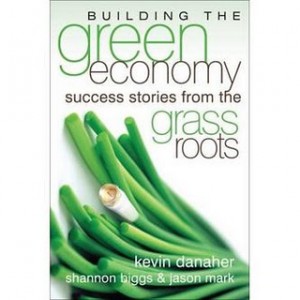 “People are so smart!” is something I often overhear at Global Exchange’s Fair Trade Store in San Francisco. As customers wander the store, I watch their sheer amazement in the “garbage” turned into beautifully hand-crafted gifts. By making creative consumer products out of post-consumer material, artisans world-wide are not only reducing their environmental footprint, but are also reminding us that it is possible to take things out of the waste stream and make profitable – and beautiful – products.
“People are so smart!” is something I often overhear at Global Exchange’s Fair Trade Store in San Francisco. As customers wander the store, I watch their sheer amazement in the “garbage” turned into beautifully hand-crafted gifts. By making creative consumer products out of post-consumer material, artisans world-wide are not only reducing their environmental footprint, but are also reminding us that it is possible to take things out of the waste stream and make profitable – and beautiful – products. 
Broken Indian bangles become sparkling picture frames and jewelry boxes.
Old Senegalese prayer mats become stylish, colorful baskets.
Flip flops in Mali become bracelets.
Used Ghanaian water bags become eco-friendly shopping bags.
Candy wrappers and chip bags become classy clutch bags in Honduras.
The logic is simple and sustainable. By reusing post-consumer waste, “trash” never makes it to a landfill, and an environmentally-invasive production cycle stops. As we are the most wasteful nation in the world, we should pay attention to this incredible usage of garbage.
There are already some American companies who are paying attention. TerraCycle, a small but successful New Jersey-based company, is pushing the boundaries of reusing waste that is hard to recycle. TerraCycle began in 2001 by two Princeton freshman, who collected Dining Hall waste and used a worm compost to make natural plant food products. Now, TerraCycle is making everything from Capri-Sun drink-pouch backpacks to M&M-wrapper messenger bags.
Green Citizen, another American company, is committed to keeping electronics out of landfills. By providing repair services (to keep electronics running as long as possible) and environmentally responsible electronics recycling, Green Citizen is doing its part to sustain already-made products, so that producing new electronics can wait.
 Read about TerraCycle and other green economic solutions in Global Exchange’s new book, Building the Green Economy, co-written by Kevin Danaher (co-founder of Global Exchange), Shannon Biggs, and Jason Mark.
Read about TerraCycle and other green economic solutions in Global Exchange’s new book, Building the Green Economy, co-written by Kevin Danaher (co-founder of Global Exchange), Shannon Biggs, and Jason Mark.
Creating beauty out of “garbage” is not only sustainable – it’s wise. We can all take a lesson in turning something less desirable into something profound, and can allow this new year to be a new beginning in our consumption habits. Let’s support those who are already stopping the consumption cycle by using recycled or post-consumer material to create!
Happy 2011 from the Global Exchange Fair Trade Stores!

